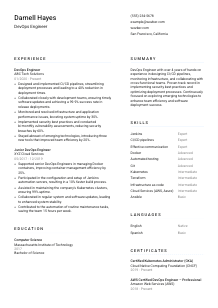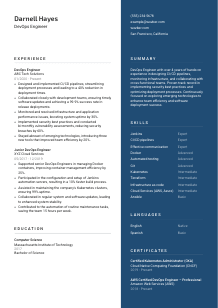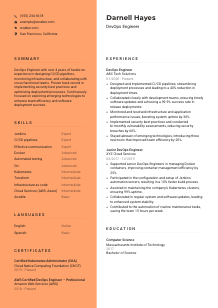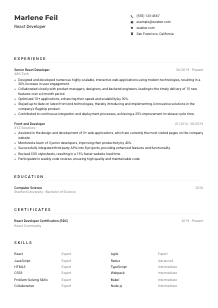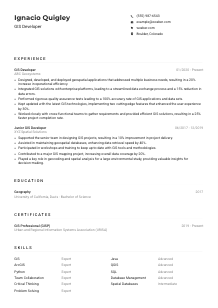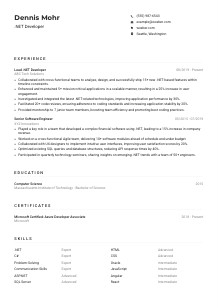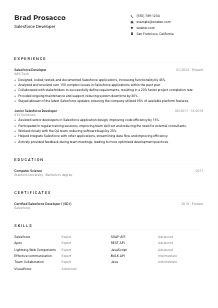DevOps Engineer Resume Example
Automating pipelines, but your resume feels manual? Check out this DevOps Engineer resume example, streamlined using Wozber free resume builder. Discover how to present your integration expertise to align with job requirements, scripting a career as smooth as your deployment processes!
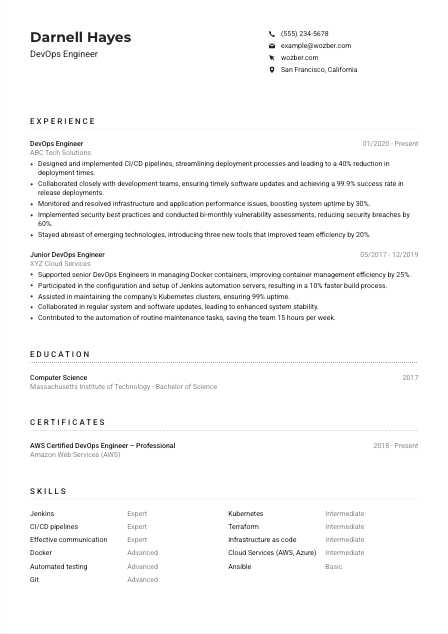
How to write a DevOps Engineer resume?
Hello, aspiring DevOps Engineer! If you're looking to land your dream job in this cutting-edge field, your resume needs to speak volumes about your technical prowess and collaboration skills. Using Wozber's free resume builder, we'll guide you through creating a resume that not only meets but exceeds job expectations. We'll tailor your resume specifically for a DevOps Engineer position, making it irresistible to hiring managers and friendly to Applicant Tracking Systems (ATS). Ready to revolutionize your resume? Let's get started!
Personal Details
In the vast ocean of applicants, your personal details section is your beacon. Let's make sure it shines bright for the DevOps Engineer role, perfectly aligned with what hiring managers are looking for.
1. Distinguish Yourself with Your Name
Your name is your headline. Bold and clear, it should grab attention. Consider a slightly larger font size, setting the stage for your professional headline: 'DevOps Engineer'. This alignment with the job title immediately tells hiring managers that you see yourself in the role.
2. Clarify Your Position
Directly beneath your name, position yourself confidently with the title from the job description, "DevOps Engineer". This targeted approach signals right away that your application is specifically crafted for this role.
3. Contact Info: Keep It Professional
Include your phone number and a professional email address in the "firstname.lastname@email.com" format. This basic yet impactful information makes it easy for potential employers to reach out and shows attention to detail.
4. Location Matters
State your city and state of residence, especially if it's the same as or near the job's location, like "San Francisco, California" in our example. This offers reassurance of your availability and saves questions about relocation.
5. Web Presence: A Modern Necessity
In today's digital world, a LinkedIn profile or a professional website can provide a fuller picture of your professional journey. Just ensure it's polished and mirrors the information on your resume.
Takeaway
Think of the Personal Details section as your resume's firm handshake. Professional, precise, and confident, it's the first step in making a strong impression. With every detail tailored to the DevOps Engineer role, you're not just a candidate; you're the candidate.





Experience
In the heart of your resume lies your experience section, a treasure trove showcasing how you're the perfect fit for the DevOps position. Here's how to ensure it radiates competence and relevant achievements.
- Designed and implemented CI/CD pipelines, streamlining deployment processes and leading to a 40% reduction in deployment times.
- Collaborated closely with development teams, ensuring timely software updates and achieving a 99.9% success rate in release deployments.
- Monitored and resolved infrastructure and application performance issues, boosting system uptime by 30%.
- Implemented security best practices and conducted bi‑monthly vulnerability assessments, reducing security breaches by 60%.
- Stayed abreast of emerging technologies, introducing three new tools that improved team efficiency by 20%.
- Supported senior DevOps Engineers in managing Docker containers, improving container management efficiency by 25%.
- Participated in the configuration and setup of Jenkins automation servers, resulting in a 10% faster build process.
- Assisted in maintaining the company's Kubernetes clusters, ensuring 99% uptime.
- Collaborated in regular system and software updates, leading to enhanced system stability.
- Contributed to the automation of routine maintenance tasks, saving the team 15 hours per week.
1. Methodical Breakdown
Analyze the job requirements, identifying key experiences like "Designing and implementing CI/CD pipelines" or "Collaborating closely with development teams". This is where you match your past roles with what's asked, highlighting the overlaps.
2. Structure Counts
List your experience in reverse-chronological order. Start with your recent role as 'DevOps Engineer', including the company name, employment dates, and location. This structure is not just ATS-friendly but also allows hiring managers to easily trace your career progression.
3. Achievements That Shine
Under each role, detail your accomplishments with a focus on how they align with the specific requirements of the job. Use active language and quantify your results where possible, like "Led to a 40% reduction in deployment times".
4. Quantify Your Impact
Numbers tell a compelling story. Whenever possible, quantify your achievements to provide tangible proof of your impact, such as "Boosting system uptime by 30%". This statistical evidence strengthens your claims and grabs attention.
5. Relevance is Key
Stick to including experiences that directly relate to the DevOps Engineer role. While it might be tempting to list every accomplishment, focusing on the most relevant ones showcases your suitability for the position with precision.
Takeaway
Your experience section is the narrative of your professional journey, emphasizing your aptitude for the DevOps Engineer role. Tailoring it according to the job requirements demonstrates not just your qualifications but your dedication and readiness for the position.
Education
Even though experience might take center stage, don't underestimate the power of the Education section. It's here that your foundational knowledge is highlighted, making it another piece of your resume puzzle that aligns with the job.
1. Key Requirements
Identify the educational requirements from the job description, like a "Bachelor's degree in Computer Science, Engineering, or a related field." This preciseness ensures your education aligns perfectly with what's sought-after.
2. Structure with Clarity
Keep this section simple yet informative. For a DevOps Engineer, listing the degree, the educational institution, and graduation date suffices. This straightforward format aids quick scans by hiring managers.
3. Degree Specifics
Align your degree details with the job's educational requirements. If you hold a "Bachelor of Science in Computer Science," as requested, make sure this is clearly stated, reinforcing your candidacy's relevance right from the education section.
4. Course Relevance
While the broader degree might suffice, highlighting specific courses relevant to DevOps (such as cloud computing or network security) could give you an edge, especially if you're early in your career.
5. Extra Mile
Graduating with honors or involvement in tech clubs or projects can reflect positively, showcasing your dedication and capability beyond coursework. While more impactful for newer entrants to the field, it adds depth to your profile.
Takeaway
Your education section should echo the qualifications the employer seeks while also highlighting your achievements and relevant courses. This careful curation portrays you as a well-rounded candidate, ready to contribute your foundational knowledge and skills.
Certificates
Certifications can be gold in the tech world, offering concrete evidence of your skills and dedication to learning. Let's navigate through showcasing your certifications most effectively for the DevOps Engineer role.
1. Examine the Requirements
While the job description might not always specify required certifications, if you hold any that are relevant—like "AWS Certified DevOps Engineer – Professional"—they can majorly bolster your application.
2. Selective Highlighting
Only include certifications that amplify your relevancy for the DevOps Engineer position. This focused approach ensures that every piece of your resume serves a purpose, showing you in the most relevant light.
3. Date Transparency
Mention the acquisition or expiration dates for certifications, especially if they are recent or prestigious. This showcases your commitment to staying current in your field, a vital aspect in the ever-evolving tech landscape.
4. Continuous Advancement
The tech field is dynamic, requiring continuous learning. Regularly updating your certifications not only keeps you competitive but also demonstrates your dedication to professional growth.
Takeaway
Carefully selected and up-to-date certifications highlight your commitment to your career and expertise in the DevOps sphere. They stand as proof of your skills, making your resume all the more compelling.
Skills
Your skill set is the toolkit you bring to any DevOps role. Here's how to ensure this section of your resume precisely reflects the requirements and expectations of your dream job.
1. Decoding the Job Description
Scrutinize the job posting to identify both explicitly mentioned and implied skills. For a DevOps Engineer, skills like "CI/CD pipelines," "Docker," and "Kubernetes" are often non-negotiable essentials.
2. Tailored Listing
Craft your skills list with a blend of technical proficiencies and soft skills, like effective communication, directly reflecting the job description. This shows you're not only capable but also a holistic fit for the team.
3. Clarity and Focus
Resist the urge to overload this section. Prioritize skills that align closely with the job's requirements, making it easy for hiring managers to see you're well-equipped for the role.
Takeaway
Your skills section is an inventory of your professional arsenal. Highlighting the right mix of abilities positions you as a prime candidate. Keep this section concise, relevant, and reflective of the job's needs, and you'll navigate the ATS with ease.
Languages
In a globalized job market, your ability to communicate across languages can set you apart. Let's tailor this section to reflect the communication skills essential for a DevOps Engineer, especially when dealing with international teams.
1. Meeting Job Specifications
Start by aligning with the job's language requirements. If "English proficiency" is a must, place your language skills front and center, stating your level of proficiency as 'Native' or 'Fluent', depending on your comfort and fluency.
2. Prioritize and Position
In addition to English, listing other languages you're proficient in showcases your ability to work in diverse teams. Position English first, followed by any additional languages, indicating your proficiency level for each.
3. Honesty in Proficiency
Be truthful about your language skills, using terms like 'Intermediate' or 'Basic' where appropriate. This honesty ensures expectations are set correctly, and there's no misunderstanding about your capabilities.
4. The Global Perspective
For roles like DevOps Engineer that may involve global collaboration, your multilingual abilities can be a strong selling point. Even non-fluent languages indicate a readiness to engage with diverse teams.
5. The Power of Language
Though not always a deal-breaker for technical roles, language skills enhance your resume, portraying you as a candidate with broad communication capabilities. They reflect your adaptability and potential to bridge cultural and linguistic gaps.
Takeaway
Your linguistic skills are a testament to your capability to thrive in diverse environments. Highlighting these, even if not a primary job requirement, adds a layer of versatility to your candidacy, showcasing you as a well-rounded DevOps Engineer.
Summary
A compelling summary ties your resume together, offering a quick glimpse of who you are as a DevOps Engineer. Here's how to make sure this vital section captivates and aligns with the job's expectations.
1. Essence of the Role
Your summary should reflect an understanding of the DevOps Engineer role. Start with a strong statement about your professional identity, emphasizing years of experience and areas of expertise, such as "Designing CI/CD pipelines".
2. Introduction with Impact
Begin your summary with a powerful introduction that encapsulates your experience and core skills. This sets the tone, indicating right off the bat why you're a perfect fit for the DevOps Engineer position.
3. Address Key Skills and Achievements
Highlight your technical skills and significant achievements that resonate with the job description, succinctly summing up your contributions in previous roles. Quantify your impact where possible to lend credibility to your claims.
4. Conciseness is Key
Keep your summary tight and focused. Three to five sentences are ideal, offering a snapshot of your qualifications and potential contributions without overshadowing the detailed accomplishments listed elsewhere in your resume.
Takeaway
The summary is your personal pitch, offering a glimpse into your professional prowess. By aligning it closely with the job's demands, you distinguish yourself as a standout candidate, ready to bring your DevOps expertise to the table.
Embarking on Your DevOps Engineer Journey
Congratulations! You're now equipped to craft a resume that not only ticks all the boxes for a DevOps Engineer position but also showcases your unique value. Lean on Wozber's free resume builder, an ATS-friendly resume template, and our ATS resume scanner to ensure your resume not only looks great but is also optimized for success.
Remember, your resume is more than a document; it's a narrative of your professional journey, ready to captivate your next employer. Dive in, and let's launch your DevOps career to new heights!

- Bachelor's degree in Computer Science, Engineering, or a related field.
- Minimum of 3 years of experience working in a DevOps or similar technical role.
- Proven proficiency with tools such as Jenkins, Docker, Kubernetes, and Terraform.
- Solid understanding of CI/CD pipelines, automated testing, and infrastructure as code principles.
- Effective communication skills and the ability to collaborate with cross-functional teams.
- Ability to effectively communicate in English is a prerequisite.
- Must be located in or willing to relocate to San Francisco, California.
- Design, implement, and manage CI/CD pipelines to streamline and automate deployment processes.
- Collaborate closely with development teams to ensure software updates are released in a seamless and timely manner.
- Monitor and troubleshoot issues related to infrastructure, application performance, and deployment processes.
- Ensure system security by implementing best practices and regularly conducting vulnerability assessments.
- Stay updated with emerging technologies and industry trends to ensure the team is utilizing the most efficient tools and processes.





